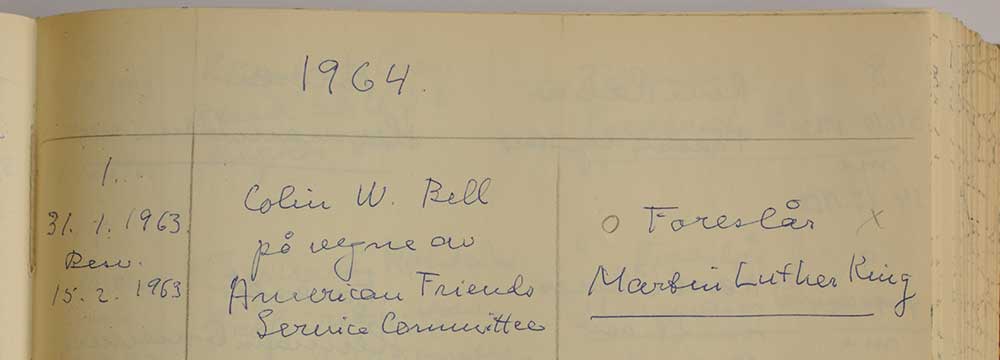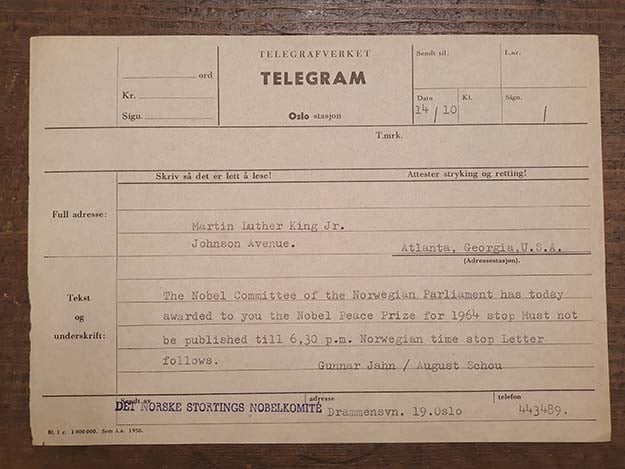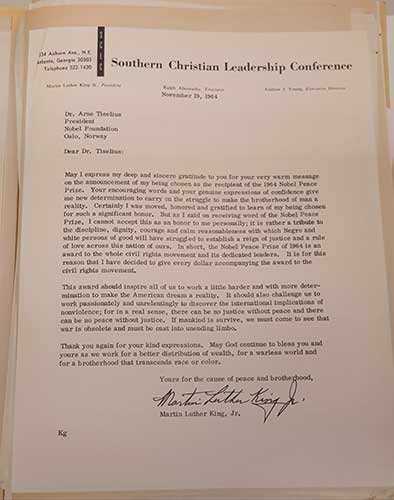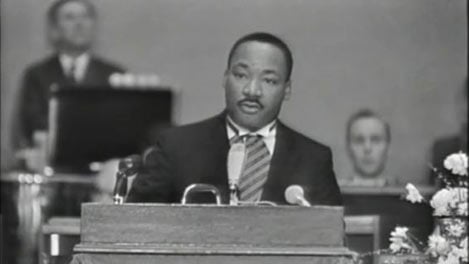Nobel Peace Prize nominations for Martin Luther King Jr.

From the archives of the Norwegian Nobel Committee.
The first peace prize nomination for Martin Luther King Jr.
The first nomination for Martin Luther King Jr. arrived to the Norwegian Nobel Committee in 1963. The Norwegian Nobel Committee, awarder of the Nobel Peace Prize since 1901, received this nomination from an earlier Nobel Peace Prize Laureate, American Friends Service Committee, (The Quakers) in Philadelphia, USA, awarded the Nobel Peace Prize in 1947. The nomination was dated 31 January 1963.
The Committee considered nominating Martin Luther King Jr. for 1963, and the letter appears to have barely arrived in time to get into consideration that year, but for some reason, the nomination was transferred to the following year. A note on the letter says “Besvart – Reserveres for 1964” (Answered – Reserved for 1964). It is possible that the Committee considered the nomination to be too late.
In the nomination, signed by the AFSC Board of Directors, it said:
African leaders, who are perhaps most aware of racial tensions, are in several striking cases seeking to create a spirit of reconciliation and to use methods that will not increase the likelihood of violence. These leaders have been influenced and are being encouraged by the example of MARTIN LUTHER KING, Jr., whose work to resolve serious conflicts without violence is also helping to reduce in the United States the indiscriminate bitterness that condemns international organization, and in particular the United Nations, because of the participation of people of non-white races and of the concern to promote “the dignity and worth of the human person” regardless of race.
Nomination letter from American Friends Service Committee
Complete nomination from American Friends Service Committee
In January 1964, a new letter arrived from the American Friends Service Committee, asking that their nomination should be transferred to 1964, and it was.
New letter from American Friends Service Committee
One more nomination
In 1964, the Norwegian Nobel Committee received another nomination for Martin Luther King Jr. It came from eight members of the Swedish Parliament (Sveriges Riksdag), dated 30 January 1964. Four of them were social democrats and four were liberal politicians.
Nomination from the Swedish Parliament (Swedish, pdf 147 kB)
These two nominations only, the one from American Friends Service Committee and the one from the Swedish Parliament, formed the foundation for the committee’s work when they investigated Martin Luther King Jr.’s candidacy.
 From the archives of the Norwegian Nobel Committee.
From the archives of the Norwegian Nobel Committee.
43 other candidates
There were 43 candidates for the 1964 Nobel Peace Prize. Of these, 13 were subject to closer investigation after a decision by the Norwegian Nobel Committee. (That’s being listed on the so-called short list.) The 13 candidates were:
Fenner Brockway, British anti-war activist and politician (assessed also in 1961 and 1962)
Hermann Gmeiner, philanthropist and the founder of SOS Children’s Villages (assessed also in 1963)
Haile Selassie I, Emperor of Ethiopia
Josef L. Hromadka, Evangelical Lutheran theologian
Martin Luther King Jr.
Mohammad Reza Shah Pahlavi, Shah of Iran
Paul-Henri Spaak, Belgian socialist politician and statesman,
Clarence Streit, war correspondent (assessed also in 1957)
Norman Thomas, socialist and pacifist
William V.S. Tubman, President of Liberia
Den internasjonale juristkommisjon (assessed also in 1962)
The Norwegian Mission Society (Den Norske Misjonsselskap)
UNICEF (assessed also in 1963).
Four candidates were not the subject of further investigations, as the Committee couldn’t find anything significant to add. These candidates were:
Martin Buber, philosopher
Cyrus Eaton, businessman and philanthropist
Stephen Galatti, Director General of the AFS, American Field Service.
Pugwash Continuing Committee
The Nobel Committee’s investigation
It was Kåre D. Tønnesson, then adviser for the Norwegian Nobel Committee, who wrote the investigation of Martin Luther King Jr. He explained thoroughly King’s background and career. For the Committee, Martin Luther King Jr. appeared to be a strong candidate. Firstly, he led an efficient and powerful mass movement. Secondly, he fought with non-violent methods. Thirdly, he was black, and the resolving of racial conflicts seems to have taken the interest of the Committee in the 1960s (starting with the 1960 Nobel Peace Prize to Albert Lutuli). Fourthly, he was not head of state. Martin Luther King Jr. stands out as by far the strongest individual candidate in 1964.
The award
On 14 October 1964 the Norwegian Nobel Committee announced that the year’s Nobel Peace Prize was awarded to Martin Luther King Jr.

Telegram informing Martin Luther King Jr. that he had been awarded the 1964 Nobel Peace Prize.
From the archives of the Norwegian Nobel Committee.

Letter of thanks from Martin Luther King Jr. to the Nobel Foundation after being informed about being awarded the 1964 Nobel Peace Prize.
From the archives of the Norwegian Nobel Committee.
On 8 December he arrived in Oslo, Norway, for the prize ceremony at the Oslo University Aula two days later, on 10 December.
Original program for Martin Luther King Jr.’s visit to Oslo (pdf 55 kB)
In his speech at the Nobel Peace Prize Award Ceremony, Gunnar Jahn, Chairman of the Nobel Committee, said:
Today we pay tribute to Martin Luther King, the man who has never abandoned his faith in the unarmed struggle he is waging, who has suffered for his faith, who has been imprisoned on many occasions, whose home has been subject to bomb attacks, whose life and the lives of his family have been threatened, and who nevertheless has never faltered.
To this undaunted champion of peace the Nobel Committee of the Norwegian Parliament has awarded the Peace Prize for the year 1964.
Watch Martin Luther King Jr. receive his Nobel Peace Prize
Watch Martin Luther King Jr. deliver his acceptance speech
 Martin Luther King Jr. delivering his acceptance speech.
Martin Luther King Jr. delivering his acceptance speech.
The nomination process for a Nobel Peace Prize
A nomination for the Nobel Peace Prize may be submitted by any person who meets the nomination criteria. The names of the nominees and other information about the nominations cannot be revealed until 50 years later.
Read more about the nomination process
Most of the information in this article is based on the book Redgjørelse for Nobels fredspris: LXIV 1964.
Courtesy of The Norwegian Nobel Committee
First published 24 September 2014
Nobel Prizes and laureates
Six prizes were awarded for achievements that have conferred the greatest benefit to humankind. The 12 laureates' work and discoveries range from proteins' structures and machine learning to fighting for a world free of nuclear weapons.
See them all presented here.
